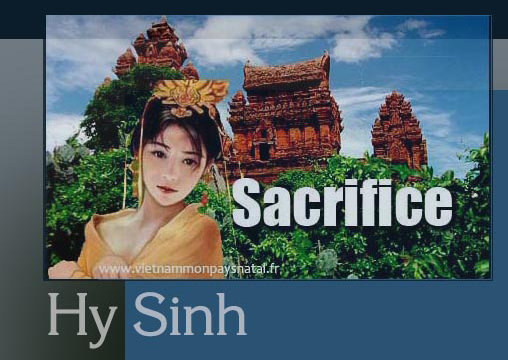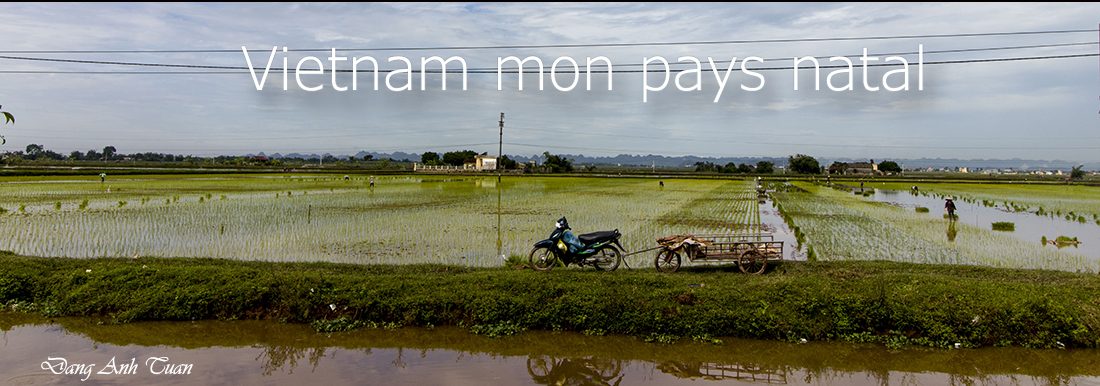
Life is a game of chance. The chance is against us. It’s worth dying now for the country and set an example of sacrifice
Nguyễn Thái Học
Vietnam is not only a land of legends and learned men but also a land that men have acquired acre by acre in a crual mother nature for more than four thousand years. The cradle of the Vietnamese nation, the delta of Tonkin bordered by mild hills of the Hundred Thousands Mounts of China and squeezed in the South by a quasi impenetrable range, the Annamitic Cordillera, reduced to 15,000 km2 but rich of all the mud pulled out by the Red river, continues to be threathened by the latter with the discharge of 500m3 at low tide up to 3500m3 during the highest crests.
To master the blows of sword of the Red River, the Vietnamese people resort to a method of building dikes, which requires not only an increased watch of dikes but also a perpetual struggle. Facing the never-ending change of nature, the caprice of the Red river and the territorial ambitions of China, the Vietnamese people owe their safety at the cost not only of their labor and courage but also of their sacrifice in the long march toward the South.
This sacrifice is not foreign to the majority of Vietnamese in particular the men and women of character. It also becomes a cult that one likes to maintain and ceaselessly praise for Vietnam to excite the whole people before the threat of foreigners.
The sacrifice is the surest way to maintain the perfection of the homeland but it is also the synonym of loyalty and dignity. A great person is the one who dares take the responsibilities in moments of difficulty in his or her life but it is also the one who knows how to sacrifice himself or herself for a good cause, in particular for his or her country. The sacrifice is indispensable to the word « honor » in Vietnam.
Because of this moral dignity, many military people prefered suicide to surrender (Trưng Trắc, Trưng Nhị, Trần Bình Trọng, Võ Tánh etc..). That is why it is the habit to say:
Hùm chết để da, người chết để tiếng.
A dead tiger leaves its hide, a deceased person his reputation.
The history of Vietnam is also that of sacrifices. The duty of a Vietnamese is to serve his or her country wholehreatedly. The greater the danger, the better his or her loyalty seems to be.
Heroes sacrifice for their fatherland. No matter what happens, his honor is never tainted. It is the case of the scholar Phan Thanh Giản, signatory of the Franco-Vietnamese treaty of 1868. After having failed to put up with the French in the defense of the three western provinces of the Mekong delta (Vĩnh Long, An Giang and Hà Tiên) he chose to surrender and decided to poison himself in 1967 because he thought it was the only way to save the people and to show his fidelity to emperor Tự Ðức. The same, Nguyễn Tri Phương (1873), adversary of Francis Garnier and Hoàng Diệu (1882), adversary of Henri Rivière preferred suicide after having failed to defend Hànội city.
During the French occupation, sacrifice became the flame of hope lit by unknown people such as Nguyễn Trung Trực, Phạm Hồng Thái. The former accepted to die in the stead of his mother captured after having succeeded in blowing up the French « Espérance » on its passage on the « Nhựt Tảo » river in Long An while the latter, chased by the Chinese police in his escape, preferred to throw himself in the river after having failed to assassinate the French governor Merlin during his passage by Canton in 1924. Admiror of his courage and sacrifice for his fatherland, the governor of Canton later buried his remains in a cemetery solely reserved for the 72 Chinese heroes and known as « Hoàng Hoa Cương » in Vietnamese.
If this sacrifice is not a vain word for men, it carries a particular meaning for the Vietnamese women. Princess Huyền Trân of the Trần dynasty was proposed to become in 1306 the wife of king Chế Mẫn (Jaya Simhavarman) in exchange of the two territories of Champa Chau Ô and Châu Rí. She had to sacrifice her life, her love for reason of State.
The same, three centuries later, a princess of the Nguyễn dynasty, of the name Ngọc Vạn to whom the word « Cochinchina » or (Cô chín xin) was attributed, was not late in following Huyen Tran’s footsteps in becoming the concubine of Cambodian king Prea Chey Chetta II in 1618 in exchange of the facilities granted to Vietnamese in their settlement in the region Ðồng Nai Mô Xoài which is no other than the Saigon-Cholon region today.
Her presence on the Cham soil served as a pretext for lord Nguyễn Phúc Tần to launch an expedition and annex the last territory of Champa in 1651. One cannot blame the Cham for hating princess Ngoc Khoa at that time because of her, they have lost their homeland. But Ngọc Khoa illustrates for us Vietnamese the sublime sacrifice she consented for her country and her people.
